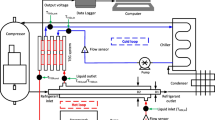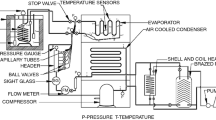Abstract
Finding an alternative solution to conventional refrigerators, which often use a vapor-compression refrigeration cycle, has always been an environmental concern. Thermoelectric refrigerator, despite its lower efficiency yet very low pollution, is one of these alternative methods. This study aimed to evaluate the performance of this type of refrigerator and compare it in terms of pollution and performance with refrigerators with vapor-compression refrigeration cycle. For this purpose, by simulating the problem, the general design of the problem is obtained. Then, by determining the type of thermoelectric used and the geometry of the refrigerator, a laboratory setup is made. Finally, a laboratory test is performed on the setup. By adjusting the required voltage and input current of the thermoelectric, this refrigerator can have a coefficient of performance of 0.38 but instead reduces pollution by about 95%.










Similar content being viewed by others
Abbreviations
- g :
-
Body accelerations
- h :
-
Convection heat transfer coefficient
- I :
-
Electric current
- k :
-
Conduction heat transfer coefficient
- P :
-
Power
- p :
-
Pressure
- Q :
-
Heat load
- q :
-
Local heat flux density
- R :
-
Electric resistance
- T :
-
Temperature
- t :
-
Time
- u :
-
Flow velocity
- V :
-
Voltage
- W :
-
Work
- \(\alpha\) :
-
Seebeck coefficient
- \(\varLambda\) :
-
Thermal conductivity
- \(\mu\) :
-
Viscosity
- \(\varPi\) :
-
Peltier coefficient
- \(\rho\) :
-
Density
- \(\tau\) :
-
Deviatoric stress tensor
- C :
-
Cold side or cold related
- E :
-
Electrical
- H :
-
Hot side
- i :
-
x-Direction
- j :
-
y-Direction
References
Abdul-Wahab SA, Elkamel A, Al-Damkhi AM et al (2009) Design and experimental investigation of portable solar thermoelectric refrigerator. Renew Energy 34(1):30–34
Astrain D, Merino A, Catalán L, Aranguren P, Araiz M, Sánchez D, Cabello R, Llopis R (2019) Improvements in the cooling capacity and the cop of a transcritical co2 refrigeration plant operating with a thermoelectric subcooling system. Appl Therm Eng 155:110–122
Aziz A, Mainil RI, Mainil AK, Syafri S, Syukrillah MF (2017) Design of portable beverage cooler using one stage thermoelectric cooler (tec) module. ACEH Int J Sci Technol 6(1):29–36
Batra J, Dabra V, Sharma P, Saini V (2019) Performance evaluation of thermoelectric refrigerator based on natural and forced mode of cooling processes. In: Advances in fluid and thermal engineering, Springer, pp 317–324
Cai Y, Wang W-W, Liu C-W, Ding W-T, Liu D, Zhao F-Y (2020) Performance evaluation of a thermoelectric ventilation system driven by the concentrated photovoltaic thermoelectric generators for green building operations. Renew Energy 147:1565–1583
Chen L, Meng F, Xie Z, Ding Z, Xia S, Feng H (2020) Thermodynamic modeling and analysis of an air-cooled small space thermoelectric cooler. Eur Phys J Plus 135(1):80
Crane DT, Bell LE (2020) Maximum temperature difference in a single-stage thermoelectric device through distributed transport properties. Int J Therm Sci 154:106404
Cuce E, Guclu T, Cuce PM (2020) Improving thermal performance of thermoelectric coolers (tecs) through a nanofluid driven water to air heat exchanger design: An experimental research. Energy Convers Manage 214:112893
Dai Y, Wang R, Ni L (2003) Experimental investigation on a thermoelectric refrigerator driven by solar cells. Renew Energy 28(6):949–959
De A, Vian J, Domınguez M (2003) Increase of cop in the thermoelectric refrigeration by the optimization of heat dissipation. Appl Therm Eng 23(17):2183–2200
Dimri N, Tiwari A, Tiwari G (2019) Comparative study of photovoltaic thermal (pvt) integrated thermoelectric cooler (tec) fluid collectors. Renew Energy 134:343–356
Dizaji HS, Jafarmadar S, Khalilarya S (2019) Novel experiments on cop improvement of thermoelectric air coolers. Energy Convers Manage 187:328–338
Gholami Pareh A, Maktabifard M, Ojaghi Seyed Saran Z, Torabi F (2015) Effect of conjugate heat transfer in designing thermoelectric beverage cooler. Energy Equip Syst 3(2):83–95
Göktun S (1996) Optimal performance of a thermoelectric refrigerator. Energy Sour 18(5):531–536
Gong T, Gao L, Wu Y, Zhang L, Yin S, Li J, Ming T (2019) Numerical simulation on a compact thermoelectric cooler for the optimized design. Appl Therm Eng 146:815–825
Guide to calculating and reporting greenhouse gas emissions. In: Standard, general directorate of health, safety and environment and passive defense, Tehran, July 2018 (in Persian)
Guo D, Sheng Q, Dou X, Wang Z, Xie L, Yang B (2020) Application of thermoelectric cooler in temperature control system of space science experiment. Appl Therm Eng 168:114888
Hamza A, Khan TA (2020) Comparative performance of low-gwp refrigerants as substitutes for r134a in a vapor compression refrigeration system. Arab J Sci Eng 45(7):5697–5712
Jeong ES (2014) A new approach to optimize thermoelectric cooling modules. Cryogenics 59:38–43
Jugsujinda S, Vora-ud A, Seetawan T (2011) Analyzing of thermoelectric refrigerator performance. Procedia Eng 8:154–159
Kwan TH, Zhao B, Liu J, Xi Z, Pei G (2020) Enhanced cooling by applying the radiative sky cooler to both ends of the thermoelectric cooler. Energy Convers Manage 212:112785
Lundgaard C, Sigmund O (2019) Design of segmented thermoelectric peltier coolers by topology optimization. Appl Energy 239:1003–1013
Luo D, Wang R, Yu W, Zhou W (2020) Parametric study of a thermoelectric module used for both power generation and cooling. Renew Energy 154:542–552
Moazzez AF, Najafi G, Ghobadian B, Hoseini S (2020) Numerical simulation and experimental investigation of air cooling system using thermoelectric cooling system. J Therm Anal Calorim 139(4):2553–2563
Moshfegh H, Eslami M, Hosseini A (2018) Thermoelectric cooling of a photovoltaic panel. In: The role of exergy in energy and the environment, Springer, pp 625–634
Palaniappan S, Palanisamy B (2013) Finite element analysis of thermoelectric refrigeration system. Procedia Eng 64:1056–1061
Qiu C, Shi W (2020) Comprehensive modeling for optimized design of a thermoelectric cooler with non-constant cross-section: theoretical considerations. Appl Therm Eng 176:115384
Rahman S, Hachicha AA, Ghenai C, Saidur R, Said Z (2020) Performance and life cycle analysis of a novel portable solar thermoelectric refrigerator. Case Stud Therm Eng 19:100599
Seebeck TJ (1821) Seebeck discovery
Shen L, Zhang W, Liu G, Tu Z, Lu Q, Chen H, Huang Q (2020) Performance enhancement investigation of thermoelectric cooler with segmented configuration. Appl Therm Eng 168:114852
Shittu S, Li G, Zhao X, Ma X (2020) Review of thermoelectric geometry and structure optimization for performance enhancement. Appl Energy 268:115075
Sofrata H (1996) Heat rejection alternatives for thermoelectric refrigerators. Energy Convers Manage 37(3):269–280
Watson C (1969) William thomson, lord kelvin (1824–1907). In: Some nineteenth century British scientists, Elsevier, pp 96–153
Author information
Authors and Affiliations
Corresponding author
Ethics declarations
Conflict of interest
The authors declare that they do not have any conflict of interest.
Additional information
Editorial responsibility: Samareh Mirkia.
Rights and permissions
About this article
Cite this article
Naghmegou, M., Torabi, F. & Borgheipour, H. Investigation of conjugate heat transfer in environmental-friendly device thermoelectric beverage cooler design. Int. J. Environ. Sci. Technol. 19, 3655–3668 (2022). https://doi.org/10.1007/s13762-021-03500-1
Received:
Revised:
Accepted:
Published:
Issue Date:
DOI: https://doi.org/10.1007/s13762-021-03500-1




